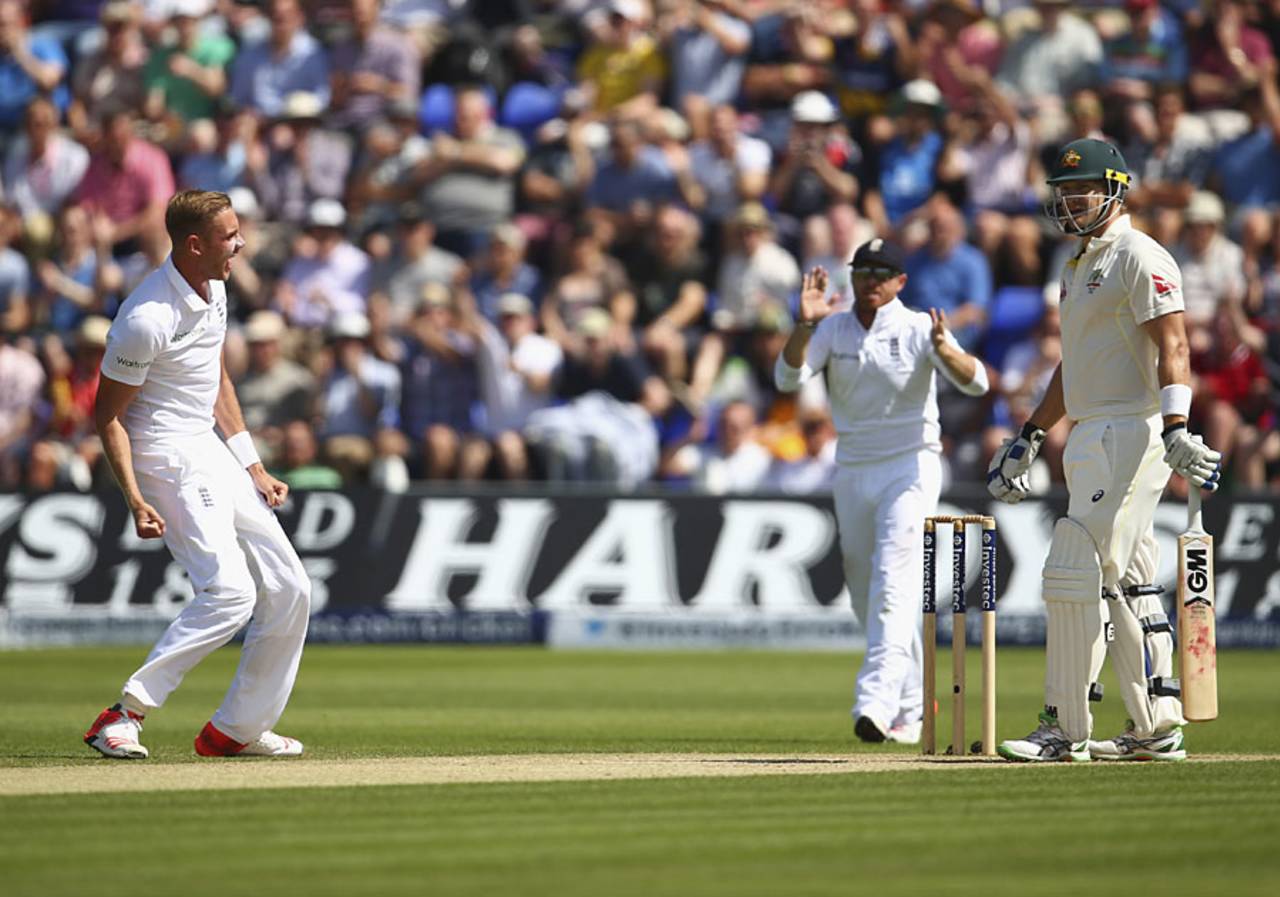Don't ask the batsman to judge if he's lbw
Cricketers of all ages are wired into thinking that they are not out, no matter how plumb
Sam Perry
Sep 6, 2016, 6:15 AM

How close was that? Let's ask Watto himself • Getty Images
"Review it! Review it!" screamed the Australians, goading Sri Lanka's Dimuth Karunaratne as they hurtled past him to backslap, high-five and bum-pat each other. Fifth over, day one, first Test: Mitchell Starc had struck the pad and elicited the raised finger to provisionally dismiss the opener, who now stood prone, mulling whether or not, as a professional batsman, he agreed. He had 15 seconds to decide, computing angles and circumstance amidst a cacophony of side-mouthed badgering from the opposition. "That's out mate! Go on, review it!"
It must be the most unnatural calculation known to anyone who has ever held a cricket bat: I've been hit on the pad. The umpire thinks I'm out. Do I agree?
Cats eat mice; lizards lie on rocks; batsmen are not out. Compelling them to think rationally about whether they are lbw or not is surely the most perverse aspect of on-field cricket in the modern age. To watch a batsman's agony as he attempts to transcend his survival reflex is either excruciating or darkly entertaining, depending on how you like your schadenfreude served.
But is it fair?
Cricket's connection to law, particularly Westminster law, is as old as the game itself. Each is meant to contain social meaning and life lessons. The relationship between the game and legal theory is well chronicled in books like David Fraser's Cricket and the Law: The Man in White is Always Right, and the parallels are pretty clear.
In the case of lbws, a batsman's protection of the stumps via pad is the crime. The bowler is the victim, or plaintiff, and the batsman is the defendant. The umpire, or judge, hands down the ruling. And in cricket's modern society, the batsman now has the right of appeal. All sounds pretty fair so far.
But if cricket's laws are meant to reflect societal values, should we be allowing the batsman - undoubtedly irrational at the key moment - an opportunity to adjudicate? Seriously, who has ever been struck on the pad and comprehensively agreed that they are out?
Batsmen, in this moment, are in a state of madness. They should be considered, for legal purposes, criminally insane.
Enter Shane Watson: the human embodiment of bad reviews and the resulting face of the most tired gag in cricket. A precociously talented cricketer who will be remembered for the grievous crime of thinking he was not out when he often was. He deserves sympathy because he's just like us.
A batsman-review at amateur level would be disastrous. Not just for their inevitably poor application but because it would compromise a key cultural pillar of cricket: the joy of casting doubt on the umpire's decision
If asked to adjudicate your own dismissal, how would you fare? It's a scenario not uncommon in maidans, nets, backyards and back alleys across the world. These arenas are like nation states: each claiming sovereignty over its territory and domestic affairs, and establishing its own culture, custom and protocol in doing so. But lbws, worldwide, remain a unilateral source of contention.
My own backyard was no different. I still remember the day - I was ten - when my dad introduced a new rule into our own nation state. I was deemed to have a grasp on the laws of lbw, so now the batsman would be the sole decision maker on all appeals. Looking back, I presume there was a moral dimension to this new legislation. I was being encouraged to trade infantile tantrums for a more sober, objective appraisal of the game. I was being taught fairness.
A batsman-review at amateur level would be disastrous. Not just for their inevitably poor application, but because it would compromise a key cultural pillar of cricket: the joy of casting doubt on the umpire's decision. Robbing players of the opportunity to wage a dressing-room whisper campaign about the veracity of their dismissal would bring to an end to one of the great sources of comedy for cricketers: watching a batsman convince himself that, yet again, he has been the victim of a bad decision.
Because batsmen, when hit on the pad, are not out. It's their natural plight. Technology may reduce the howler and help us arrive at the truth, but an elegant law may reflect some understanding of this phenomenon.
When my dad struck me on the toe, or back leg, fully covering the stumps, I knew what the answer was. I am not out, because I'm normal and I want to keep batting. I may be wrong, but I am in no state to decide.
Karunaratne didn't think he was out either, but he took too long to decide. He was out. "Suck s***!" bellowed one Australian as the opener plodded off.
When it comes to getting out, we are all children, and so it should remain.
Sam Perry is a Melbourne-based sportswriter @sjjperry